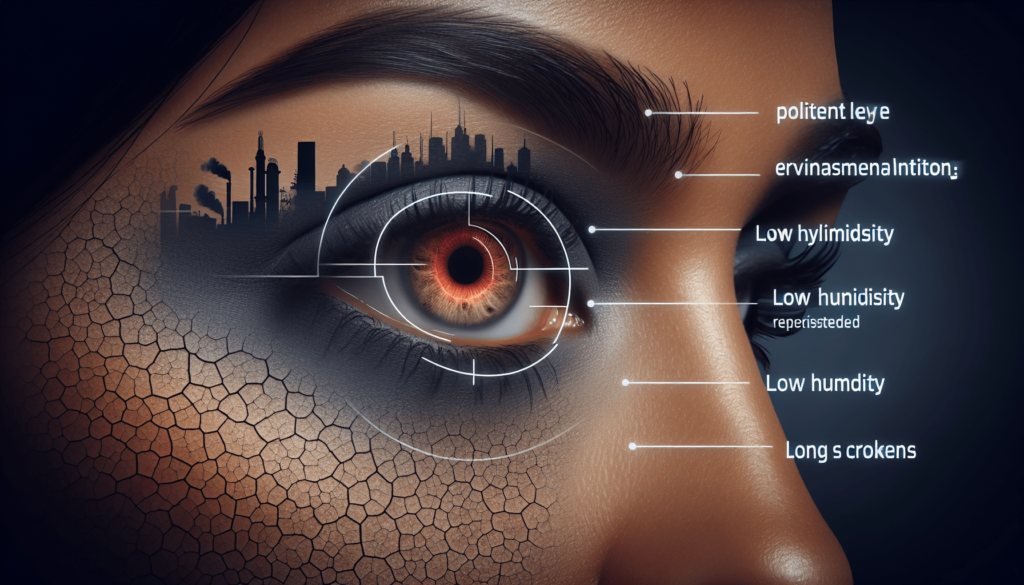Welcome to the fascinating world of genetics and dry eye! In recent studies, researchers have started to uncover potential genetic factors that may play a role in the development of dry eye syndrome. By exploring your genetic makeup, scientists may be able to pinpoint specific genes that contribute to the condition, opening up new possibilities for personalized treatments in the future. Let’s delve into the exciting findings and implications of this growing field of research.
Are There Genetic Factors That Contribute To Dry Eye?
Have you ever wondered if dry eye is a condition that could be passed down through your genes? This article will explore whether there are genetic factors that contribute to dry eye and what you can do to manage this condition effectively. So, let’s dive into the world of genetics and dry eye.
Understanding Dry Eye
Before we delve into the genetic aspects of dry eye, let’s first understand what this condition is all about. Dry eye occurs when your eyes are unable to produce enough tears or when the quality of your tears is poor. This can lead to discomfort, irritation, and in severe cases, vision problems.
Dry eye can be caused by a variety of factors such as aging, hormonal changes, medications, environmental conditions, and lifestyle choices. But could genetics also play a role in the development of dry eye?
Genetics and Dry Eye
Research has shown that genetics may indeed play a role in the development of dry eye. Certain genetic factors have been linked to an increased risk of developing this condition. Studies have found that individuals with a family history of dry eye are more likely to experience dry eye symptoms themselves.
The Role of Inflammation
Inflammation plays a significant role in the development of dry eye. Genetic factors can influence how your body responds to inflammation, which in turn may impact your risk of developing dry eye. If you have certain genetic variations that predispose you to inflammation, you may be more susceptible to developing dry eye.
Tear Film Stability
The tear film is essential for maintaining the health of your eyes and preventing dry eye. Genetic factors can affect the composition and stability of your tear film, which may increase your risk of experiencing dry eye symptoms. If you have genetic variations that impact the production of certain tear components, you may be more prone to developing dry eye.
Immune System Response
Your immune system plays a crucial role in protecting your body from infections and maintaining overall health. Genetic factors can influence how your immune system functions and how it responds to external threats. If you have genetic variations that affect your immune system, you may be more susceptible to developing dry eye due to an inappropriate immune response in your eyes.
Managing Genetic Risk Factors
While you cannot change your genetic makeup, there are steps you can take to manage genetic risk factors for dry eye. By understanding your genetic predisposition to dry eye, you can work with your healthcare provider to develop a personalized treatment plan that addresses your specific needs.
Personalized Treatment Plans
Consulting with an eye care professional is essential to determine the best course of action for managing your dry eye symptoms. Your healthcare provider can help you identify genetic risk factors for dry eye and recommend treatments that target the underlying causes of your condition.
Lifestyle Modifications
Making lifestyle modifications such as staying hydrated, taking breaks from screens, using humidifiers, and maintaining good eye hygiene can help manage dry eye symptoms. These simple changes can go a long way in alleviating discomfort and improving the health of your eyes.
Dietary Supplements
Certain dietary supplements such as omega-3 fatty acids, vitamin D, and flaxseed oil have been shown to support eye health and reduce dry eye symptoms. By incorporating these supplements into your daily routine, you may be able to manage genetic risk factors for dry eye more effectively.
Prescription Medications
In some cases, prescription medications such as artificial tears, anti-inflammatory drugs, and immunosuppressants may be necessary to manage severe dry eye symptoms. Your healthcare provider can prescribe medications that target the specific underlying causes of your dry eye, helping you find relief and improve your quality of life.
Conclusion
In conclusion, genetics may indeed play a role in the development of dry eye. Certain genetic factors can influence inflammation, tear film stability, and immune system response, all of which contribute to the onset of dry eye symptoms. By understanding your genetic risk factors for dry eye and working with your healthcare provider to develop a personalized treatment plan, you can effectively manage this condition and improve the health of your eyes. Remember, knowledge is power when it comes to your eye health, so stay informed and proactive in caring for your eyes.


